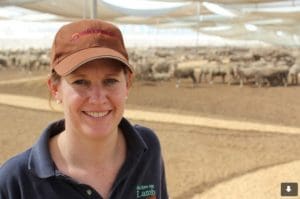Australian sheep producer and SCA vice president Allan Piggott in Oman.

SCA chief executive officer Dr Kat Giles at an ESCAS-approved feedlot in Dubai.
AUSTRALIAN sheep meat producers have insisted on the maintenance of live export animal welfare standards as the annual Festival of the Sacrifice or Eid al-Adha started across the Middle East today.
After a recent Arabian Gulf live export supply chain tour before the Eid festival started, Sheepmeat Council of Australia chief executive officer Dr Kat Giles said sheep producers were aware that the festival puts live sheep supply chains under significant pressure and increased the risks of unacceptable animal welfare breaches and other Exporter Supply Chain Assurance System non-compliance.
“Australian producers are proud of the role they play in servicing Middle East markets during the busy festival season, and throughout the year.
“But we also expect that our sheep are traded in secure supply chains which uphold full control, traceability and welfare standards.”
Dr Giles vowed to continue to seek re-opening of the Saudi Arabia live export trade and said the SCA will continue to support industry efforts to expand the trade to new and pre-existing live sheep markets which uphold Australian livestock export welfare standards.
“The re-opening of trade with Saudi Arabia, with demand for at least one million Australian sheep annually, would drive a 50 percent increase in the total number of Australian sheep exported to the Middle East each year.
“This is an exciting market opportunity for Australia’s sheep meat industry, but one which must be pursued in a way which embeds Australian welfare standards into any re-opened supply chains.”
Click here to get the latest Sheep Central story links sent to your email inbox.
As trade volumes increased ahead of the high-demand festival period, Australia exported its one millionth live sheep for 2017 earlier in August, more than three-quarters of which departed from Fremantle. Kuwait and Qatar have imported more than 330,000 head each, with many of the others going to other Middle East markets.
Dr Giles said it is important that producers continue to be active stakeholders in the live sheep trade and collaborate with exporters at an industry level to promote long-term sustainability through ongoing market development and animal welfare research initiatives.
“Producers also expect that exporters and importers continue to implement changes which improve welfare outcomes in market.”
Australian Livestock Exporters’ Council Chairman, Hon Simon Crean, said months of collaborative planning and preparation by industry in the lead-up to busy religious festivals in key Muslim markets reflected Australia’s long-term commitment to a sustainable livestock export trade.
Mr Crean said the annual spike in demand for live animals for the Festival of the Sacrifice presented challenges for livestock exporters and their importing customers, but that in-market preparation had boosted the industry’s confidence that the 2017 festival would deliver further progress in the management of Australian livestock during the annual celebrations.
Mr Crean said significant year-on-year improvements in the handling and processing of Australian livestock were facilitated by long-term planning by Australian exporters, in collaboration with in-market supply chain partners.
“Not only does the Festival of the Sacrifice (known as Eid al-Adha in the Middle East and Korban in South East Asia) place considerable pressure on Australia’s world-leading control and traceability livestock systems, it also places increased attention of the integrity of our supply chains,” Mr Crean said.
“Our industry welcomes that scrutiny because we are proud of the continuous improvements we’re achieving and we do not shy away from the challenges and risks inherent during these busy periods.”
Mr Crean said poor welfare outcomes were never acceptable and that ALEC believed the relevant powers regulating livestock export supply chains should be exercised in response to any deliberate breaches.
“Our industry’s objective is to continue to work with our international customers to identify and control any risks in the supply chain, and respond promptly whenever the welfare of Australian livestock is threatened,” Mr Crean said.
“Despite our best efforts, we accept that no system is 100 per cent fail-safe and that the biggest risk to the welfare of Australian livestock is leakage from approved supply chains.
“Exporters have already been pro-active in reporting and rectifying supply chain leakages in-market in recent weeks and will continue to monitor local markets and abattoirs for any non-compliance.”



HAVE YOUR SAY